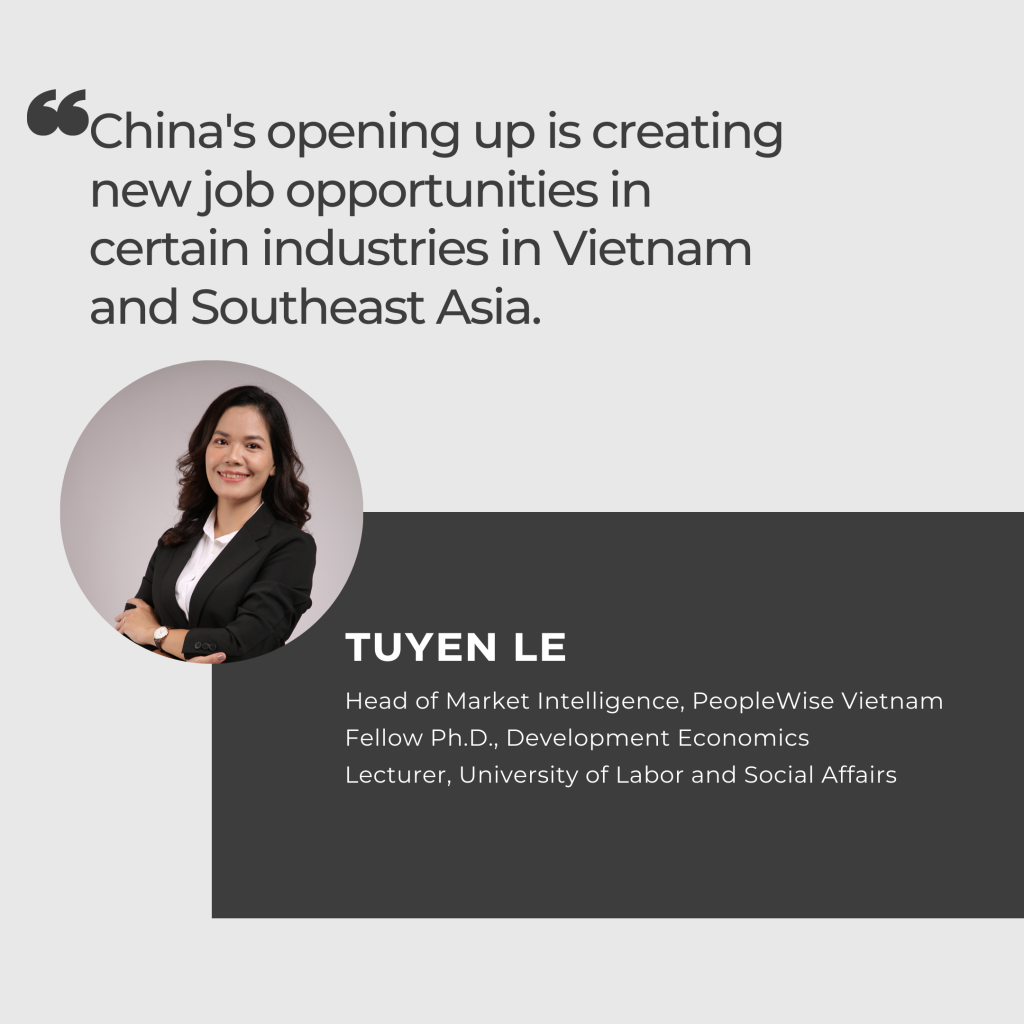In the context of potential global economic fluctuations, Southeast Asia’s economic outlook shows positive signs of growth and employment opportunities following China’s reopening. Southeast Asia is well-positioned to benefit from China’s reopening after a three-year closure due to Covid-19, particularly in the tourism, export, and foreign direct investment (FDI) sectors.
Tourism and related services
Tourism is certainly a bright spot in the economy and increases employment opportunities in Southeast Asia. Thailand is expected to benefit the most, but for countries like Vietnam, Singapore, and Malaysia, tourism revenue is still significant. In Thailand and Vietnam, Chinese tourists accounted for about 30% of total visitors before the Covid-19 outbreak.
With China’s reopening, along with the forecasted increase in Chinese tourists, the Tourism Authority of Thailand (TAT) has adjusted its foreign visitor forecast from 18-20 million to 25 million in 2023. Although Vietnam’s economy is not only relied on tourism like Thailand, the importance of this industry for the job market cannot be overlooked. In Vietnam, about 25% of the workforce is employed in the food and beverage and accommodation-related industries, so an increase in Chinese tourists will open up many job opportunities for these sectors and related services in Vietnam.

China’s reopening will also see a return of business trips, and Singapore will benefit from conferences, events, and business exhibitions. In addition, the recovery of tourism revenue will help improve the current account balance of Southeast Asian countries, reducing their trade deficits. Even in markets that are not heavily relied on tourism, the return of Chinese tourists will boost employment recovery. Thanks to Chinese tourists, the Southeast Asian labor market will recover significantly, especially in tourism-related industries such as food, beverages, entertainment, and hotels.
Exports
Southeast Asia is the largest trading partner of China, so the recovery of China’s demand will boost exports from the region. China’s reopening will lead to higher consumption and stronger relation with the global economy. In 2022, Malaysia and Indonesia, two resource-exporting countries in ASEAN, benefit greatly from the high global prices of natural resources and minerals. The recovery of China is likely to help limit the decline in natural resource prices, which will continue to benefit both countries.
Other countries may increase their agricultural exports to China, such as Vietnam’s dragon fruit, the Philippines’ bananas, and Thailand’s durian. This can help create job opportunities in the agricultural and related exporting industries. However, Southeast Asia’s economic growth is vulnerable to China’s industrial cycles, which makes it susceptible to global trade difficulties.
China’s Foreign Direct Investment
Regarding FDI, the signals of recovery in trade prospects come from China’s FDI, a field that has increasingly seen China’s imprint in ASEAN. In recent years, China has invested strongly in the booming manufacturing sector of ASEAN, from the electric vehicle supply chain in Indonesia and Thailand to consumer electronics in Vietnam, as well as the promising pharmaceutical industry in Singapore.
China quickly caught up and became the largest FDI source country into ASEAN (excluding intra-ASEAN investments) in 2021, on par with Japan. In the manufacturing sector, Indonesia, Vietnam, and Thailand have witnessed a strong increase in the proportion of FDI from China, which previously focused on real estate investment. Although this process has been partially disrupted by the pandemic, after reopening, the promotion of China’s investment in ASEAN will continue to develop strongly and will increase job opportunities in coming, especially in the technology, e-commerce, electronics manufacturing, and healthcare sectors.
“Despite the challenges that accompany the opening up of a large economy, these positive signals will provide additional impetus for economic growth and job creation in Southeast Asia, and the region will likely attract more investors in the near future,” as Ms. Tuyen said

Head of Market Intelligence, PeopleWise Vietnam.
As a Ph.D. Student, Research in Economics, Tuyen Le provides market insights, industry trends, and research on labor and workforce effectiveness. Through her research and analysis, she helps business leaders identify potential risks and threats to their businesses and industries, allowing them to take preemptive measures and invest with calculated risks and outcomes.


Thanks for your information